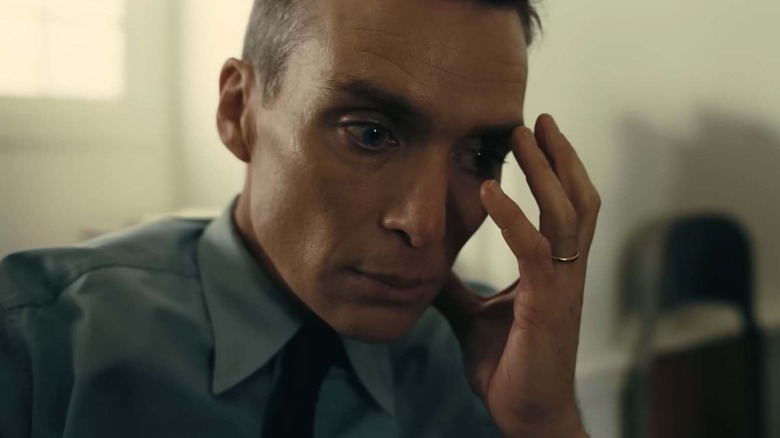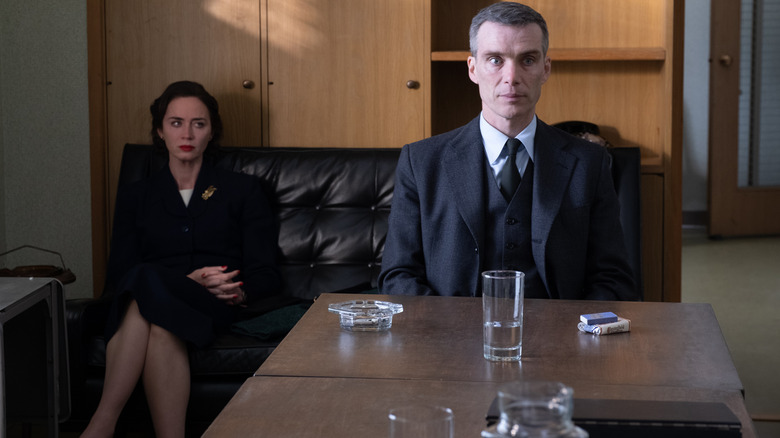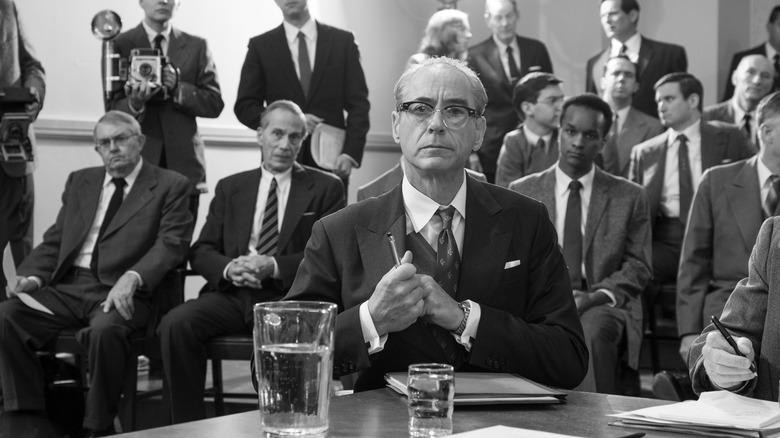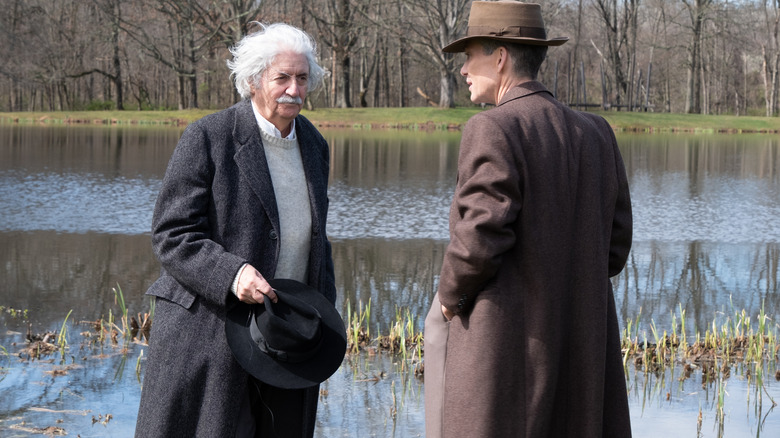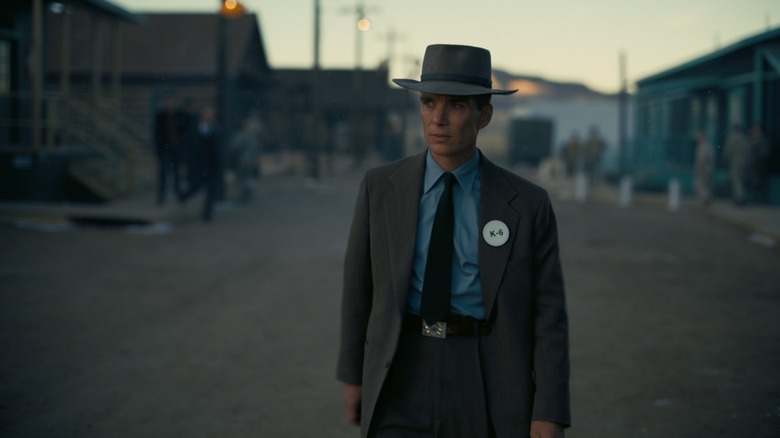Oppenheimer Ending Explained: Did We Destroy The World?
Is "Oppenheimer" Christopher Nolan's best, most ambitious film yet? That might sound hard to believe from the director who delivered a movie with a complicated series of timelines in "Memento," an entire "Batman" trilogy, the dream-within-a-dream-within-a-dream meticulousness of "Inception," more timeline shenanigans with "Dunkirk," and, oh yeah, that feature-length excuse to film things in reverse known as "Tenet." But even with all those examples under Nolan's belt, what else would you call a movie adaptation of J. Robert Oppenheimer's definitive biography, "American Prometheus," seeking to unravel the brilliance, guilt, and hypocrisy at the heart of such a controversial and paradoxical figure in history? As brought to life with such nuance by Cillian Murphy, this is a protagonist — and, by extension, an entire story — unlike any other that Nolan has attempted to tackle before.
That story plays out in quintessential Chris Nolan fashion, unspooling in two separate timelines delineated by on-screen subheads: "Fission," told in color and through Oppenheimer's perspective, and "Fusion," depicted in black-and-white from the point-of-view of Oppenheimer's main political rival, Lewis Strauss (Robert Downey Jr.). Taken together, these dueling narrative threads paint a complete picture of Oppenheimer's life told non-sequentially. This includes his early days at Cambridge as a troubled, ineffective, and impulsive youth; his young adulthood as he surrounded himself with likeminded leftists during a fiercely anti-Communist period in American history; and his recruitment and involvement in the vaunted Manhattan Project during World War II. The film's main framing device also makes room for a series of hearings — one in private concerning Oppenheimer's revoked security clearance, and another revolving around Strauss' confirmation as Commerce Secretary under President Dwight D. Eisenhower.
Both hinge entirely on Oppenheimer, coming together in unexpected and thrilling ways as Nolan drives the plot towards its inevitable conclusion.
What you need to remember about the plot of Oppenheimer
The first shot of the film opens on a young and disheveled Oppenheimer staring at a puddle in Cambridge, interspersed with visions (nightmares?) of the chaos and explosiveness of the quantum universe that only he can see. But the actual story of "Oppenheimer" only begins upon his opening statement to a trio of arbitrators who hold the fate of his post-WWII security clearance and, more importantly, his very reputation in their hands. In a series of flashbacks that has invited comparisons to David Fincher's "The Social Network" (although Oliver Stone's "JFK" might be even more apt), the main plot unfolds as a series of recollections and memories that butt right up against Strauss' own interpretation of those events, as he similarly is called upon to testify on the nature of his fraught relationship with Oppenheimer decades later.
Befitting such a complex web of details, the plot of "Oppenheimer" definitely requires close attention. Early on, Nolan's script deftly introduces a series of individuals who will go on to play incredibly important roles later in the film – Kenneth Branagh's acclaimed physicist Niels Bohr, Florence Pugh's mistress and Community Party member Jean Tatlock, and many more. After establishing Oppenheimer's left-leaning political values, womanizing ways, and his desire to bring his knowledge of quantum physics to a largely indifferent United States, the film moves forward to Oppenheimer's teaching position at the Institute for Advanced Study in Princeton. Here, he accomplishes many scientific breakthroughs, pursues Jean, and ultimately follows a path that will put him on the radar of General Leslie Groves (Matt Damon), the military man behind the Manhattan Project.
This is also where Strauss remembers his first meeting with Oppenheimer, which quickly curdled into a vindictive grudge against him.
What happened at the end of Oppenheimer?
Nolan carefully designed the structure of "Oppenheimer" as a build-up to humanity's very first detonation of an atomic nuclear weapon, held in Los Alamos, New Mexico during the infamous Trinity bomb test — but that's not the film's main focus. In fact, even that pivotal sequence is treated as the mere turning point separating both halves of Oppenheimer's life. From that point on, he must wrestle with his involvement in the project that led to the eventual deaths of everyone affected by the Hiroshima and Nagasaki bombings and the nuclear arms race that goes on to dominate the Cold War.
That guilt and shame goes a long way to explaining why Oppenheimer subjects himself to the unfair and completely biased process against him in the matter of his security clearance, which more closely resembles a kangaroo court of prosecutors who aren't required to uphold the typical due process of the court system. Instead, as Strauss himself describes it, they're not meant to "convict," only to "deny." This dovetails perfectly with Strauss' own hearings, which puts him and his senate aide (an unnamed character played by the excellent Alden Ehrenreich) on the offensive as his past dealings with Oppenheimer are called into question.
The entire last hour or so of "Oppenheimer" shifts gears from a historical epic/thriller to an overt political drama, hammering home all the ways Strauss became consumed by his political differences and petty personal grievances against Oppenheimer. Although the "formality" of the hearings soon turns into something much more serious, Strauss is convinced he still has the votes needed to save face. That is, until testimony by David Hill (Rami Malek), a former physicist connected to the Manhattan Project, exposes just how unfit for the position Strauss really is.
What does the end of Oppenheimer mean?
Between the prominence that Strauss takes during this portion of the film and the recurring appearances of Tom Conti as Albert Einstein, viewers may have wondered what all this was building towards. Everything clicks into place as the story lurches towards its extremely moving final moments. It all comes down to the world-changing power unleashed by the atom bomb and the idea of what, exactly, counts as destroying the world.
Early in the film, Oppenheimer's team of scientists struggle over the possibility that detonating a nuclear device might cause an unstoppable chain reaction that would ignite the very atmosphere of the planet and completely annihilate humanity. Although the likelihood of that outcome proves to be "near-zero" and narrowly worth the risk, the ominous words and the sheer responsibility of this new technology hangs heavy over the rest of the story. But it's the most minor and pettiest of interactions that both Oppenheimer and Strauss fall prey to at different points of their rivalry. Oppenheimer, preoccupied by his genius and arrogance, publicly humiliates Strauss in an unrelated public hearing over the use of isotopes in nuclear weapons. Strauss, carrying an enormous chip on his shoulder, uses this and his first interaction with Oppenheimer — when his brief talk with Einstein leads the scientist to completely snub an uncomprehending Strauss — to launch his one-man campaign against Oppenheimer.
The final sequence, however, recontextualizes everything we thought we knew. After Strauss' humiliating defeat, we flash back to that fateful meeting with Einstein. Consumed by guilt, Oppenheimer reminds Einstein of their research decades ago that suggested they might have destroyed the world. When asked to elaborate, Oppenheimer suggests that they actually did — not literally, but by channeling Prometheus and giving humanity power that should've remained forever beyond their grasp.
Now I am become death ...
Christopher Nolan has always taken great pains to peel back the layers of icons and legends to find the actual human being underneath. Whether it's Batman or the builder of the bomb, these characters have allowed the filmmaker to do exactly what he does best. In "Oppenheimer," Nolan crafts the perfect ending to deal the film's most poignant and sobering blow.
Fans may not have expected such a sweeping and epic story to end on an incredibly brief interaction between Oppenheimer and Einstein, but this really holds the key to Nolan's overall approach. Other than "The Dark Knight" trilogy, which features three movies ending on various images representative of much larger symbols, the vast majority of his films choose much quieter and more intimate moments in the same vein as "Oppenheimer." The shocking twist at the end of "The Prestige" only demonstrates the extreme lengths its main characters resorted to in their self-destructive quests. "Inception" is most well-known for that perpetually spinning top (or was it?), but the much more important takeaway involves a man walking away from that totem and everything it stands for in favor of choosing his family. And most notably, "Dunkirk" purposefully avoids its most "obvious" ending of the burning plane in favor of a much more human moment with its main lead.
With "Oppenheimer," Nolan boils down the entire dramatic conflict of the film to one man's profound guilt, regret, and cynicism over his own actions. The film spends a significant amount of time dissecting Oppenheimer's motivations for his wartime work, and just as much time tearing down his justifications for the mass murder of thousands. In the end, audiences become haunted by the same words we heard him recite early on: "I am become death, the destroyer of worlds."
